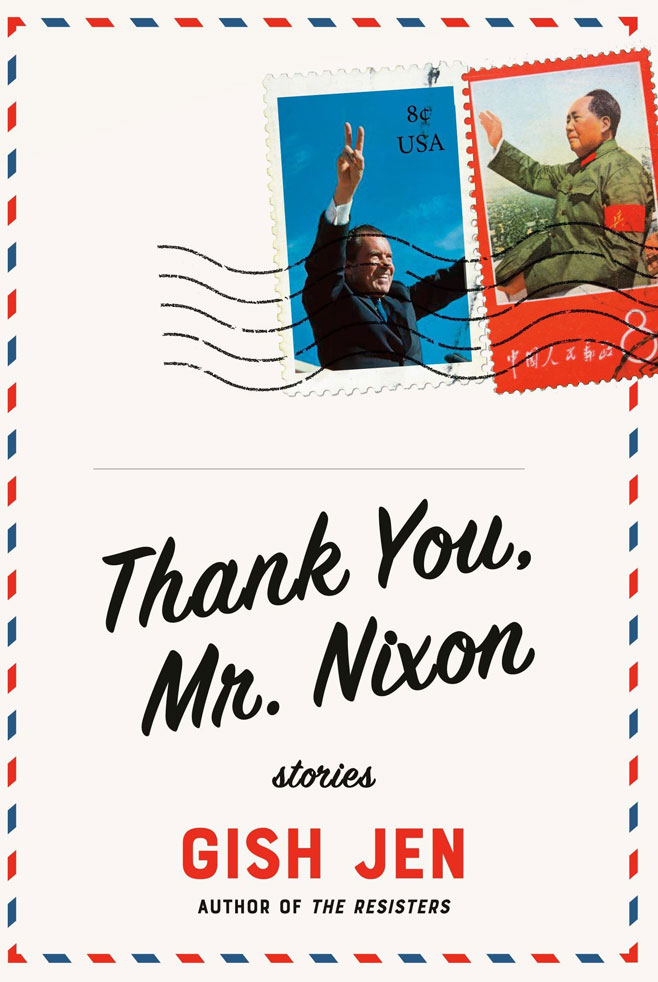Fulbright Chronicles, Volume 1, Number 4 (2023)
Author
Barbara Bennett Peterson

Thank you, Mr. Nixon: Stories by Gish Jen, Fulbrighter to the People’s Republic of China in 2003.
Award-winning novelist and short story writer Gish Jen’s latest book is Thank You, Mr. Nixon, a collection of linked short stories which begin with former President Richard Nixon’s visit to China in 1972 and end with the Covid-19 worldwide pandemic. Jen is sensitive and insightful, moving with dexterity, for example, from complications of the Cultural Revolution to the simplicity of airing spring quilts; from the significance of dull Mao jackets in blue and grey to the complexities of a foreign expert’s life in China teaching English at a coal-mining institute and falling in love. A Chinese-American herself, she speaks with a Chinese voice and a brilliant knowledge of China during the last momentous fifty years. With each story, the book becomes more penetrating and nuanced as the characters overlap and their life experiences interconnect.
With each story, the book becomes more penetrating and nuanced as the characters overlap and their life experiences interconnect.
The first short story “Thank You, Mr. Nixon” offers context: The narrator, a Little Red Guard in the time of Mao, meets the perceived “American imperialist” President Nixon. She’s careful to restrict her speech so as not to offend. The Little Red Guard admires Pat Nixon’s red coat and says, “Thank You, Mr. Nixon” for introducing exchange opportunities with China, explaining: “We loved our country, but it was not red flags that we wanted. It was red coats” (6).
“It’s the Great Wall” introduces China’s major tourist attractions: the Great Wall, Forbidden City, Summer Palace, Ming Tombs, Chinese hotels, masses of bicycles, the Guangzhou train station, and the Beijing airport. But it goes beyond that, providing vivid description: “There were bicycles and carts everywhere as well as buses, trams, trucks and what appeared to be old Russian cars . . . On the smaller streets, people squatted outside their homes, chopping and smoking….pigeons were drying…laundry hung everywhere” (19-20).
In “A Tea Tale” a young Chinese-American couple attempts to open a tea shop in the US but must deal with their tea suppliers in Yunnan Province, China. When a dispute breaks out, they undergo conflict resolution. The narrator remarks, “Everyone wants a piece of China” (95).
The importance of achievement in Chinese culture is paramount in “Mr. Crime and Punishment and War and Peace,” which first appeared in the Yale Review. There, a Chinese law student desires to become an immigration lawyer to aid her countrymen in obtaining either a green card or American citizenship (the title comes from the fact that the male student who helps her recommends Dostoyevsky). This is also a tale of Chinese loyalty, especially when abroad in American universities. Other traditional Chinese values are portrayed here as well: respect for one’s elders, the value of hard work, the value of an education, the duty to honor one’s parents and relatives, the acceptance of racial diversity, and the expectation to lead an “upright” life.
This last theme is also treated in “Rothko, Rothko,” the tale of a young Chinese art forger who desires to sell her fake Rothko paintings for millions. In the end, she does the right thing and the deal falls through, but she and her cohorts console themselves knowing their parents would be proud.
Several stories, including the last one, “Detective Dog,” which was originally published in The New Yorker and was included in the Best American Short Stories of 2022, focus on the differences between Hong Kong and the Chinese Mainland and the character of Bobby Koo. Bobby Koo, originally from Hong Kong, makes good money on Wall Street following her graduation from a prestigious American university, but she falls into a romance with a drummer, who leads her to become a dissident in Hong Kong, protesting the island’s annexation by the Mainland. “Detective Dog” is a crescendo wherein all the stories come together. The author reveals that living in America is a blessing: It’s a place of freedom and opportunity wherein one can teach Thoreau and even his ideas of Civil Disobedience.
Gish Jen is spot-on in her description of Chinese customs and viewpoints throughout this collection. She uses her stories to teach moral lessons, to engender an appreciation for things Chinese, and to offer historical perspective in contrast to the larger picture of Chinese-American interactions. She artfully weaves together the interactive histories of the last fifty years of China and America, suggesting what these superpowers have to offer one another—and reinforces Senator Fulbright’s ideas of pursuing international understanding.
Gish Jen, Thank you, Mr. Nixon. New York: Alfred A. Knopf, 2022. 256 pages. $28.00.
Biography

Barbara Bennett Peterson is an Emeritus Professor of History at the University of Hawaii and a former Fellow at the East-West Center, Honolulu, Hawaii. She was also a Professor of History by Courtesy at Oregon State University and has taught for California State University San Bernardino, Palm Desert campus in retirement. She is married to Dr. Frank L. Peterson, Emeritus Professor of Geology, University of Hawaii. Barbara Peterson was the founding president of Hawaii’s Fulbright Chapter. She has published 22 books and was nominated for the Pulitzer Prize seven times. She is a Distinguished Alumni of the University of Hawaii. She was a Senior Fulbright Scholar to Japan (1967) and to China (PRC 1988-89). Her email address is fandbpeterson@comcast.net
